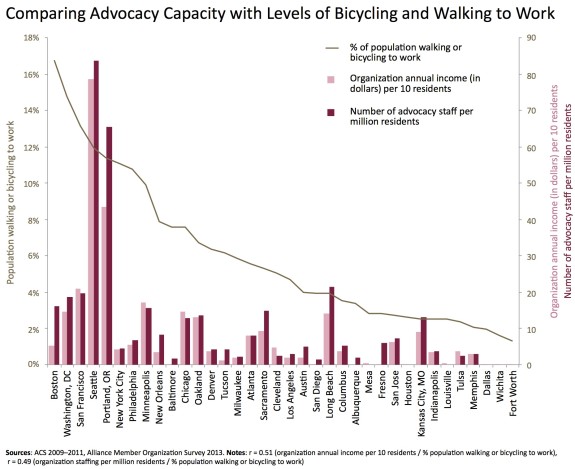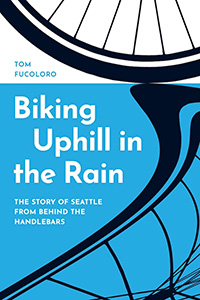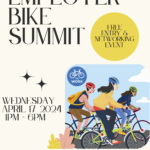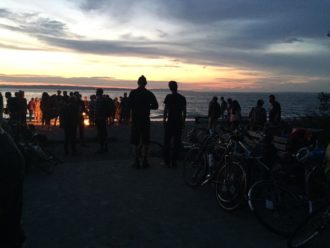 When it comes to advocacy organizations in the United States, Seattle and Portland have no peers. And even Portland is a distant second compared to the advocacy muscle in Seattle and the Puget Sound region.
When it comes to advocacy organizations in the United States, Seattle and Portland have no peers. And even Portland is a distant second compared to the advocacy muscle in Seattle and the Puget Sound region.
The data comes from the national Alliance for Biking and Walking’s annual Benchmarking Report, which was released Wednesday. The report is packed with tons of data about how our nation, its states and its major cities are doing with regards to biking and walking safety and promotion.
But it’s the section on advocacy organizations where Seattle really stands out. If there really is an All-Powerful Bicycle Lobby conspiring to submit the United States to United Nations control (I wish I were making this up, but this is a claim made by an actual major party candidate for Governor of Colorado), then Seattle is the training camp for this shadowy army.
Joking aside, Seattle really is in a unique position to put private dollars to work trying out new ideas and encouraging more bicycling and walking. Cascade Bicycle Club claims to have more than 15,000 members, and its budget is fueled by a series of bike events that have become nationally-known classics. The annual Seattle-to-Portland ride draws 10,000 participants and sells out nearly six months in advance every year.
The report’s figures are not perfect. Certainly there are organizations not included that do work on biking and walking. There are also organizations that are listed that do lots of work not directly related to advocacy. But the figures are probably at least in the ballpark. The report does not break down the numbers into each individual group, and Seattle’s numbers represent the sum of Cascade, Bike Works, Feet First and Undriving. But Cascade and its 30+ staff members certainly make up a huge portion of the total. Here the data breakdown:
 As you can see, Seattle bike/walk advocacy pitches a no-hitter. To put this in perspective, Seattle’s total advocacy group income tops even New York City and Chicago, which have far larger populations and very active advocacy organizations. On a per capita basis, Seattle’s $7.87 is almost not comparable to other US cities. For example, Los Angeles bike/walk advocacy organizations have a budget of $0.19 per capita.
As you can see, Seattle bike/walk advocacy pitches a no-hitter. To put this in perspective, Seattle’s total advocacy group income tops even New York City and Chicago, which have far larger populations and very active advocacy organizations. On a per capita basis, Seattle’s $7.87 is almost not comparable to other US cities. For example, Los Angeles bike/walk advocacy organizations have a budget of $0.19 per capita.
Of course, this data is not all apples-to-apples. As both an advocacy and events organization, Cascade does not spend all its income on advocacy and education work. Events like big rides and the Bike Expo are expensive to put on. And Bike Works focuses its efforts on youth empowerment programming, which is advocacy work in its own way. But they don’t necessarily use their budget and staff to lobby government leaders (nor should they).
These caveats aside, the point stands: Seattle’s non-profit organizations dedicated to biking and walking can and should be leading the nation and taking chances on new ideas to encourage more people to bike and walk and — if it is their mission — to encourage leaders to invest in making streets safer.
That’s why we are keeping a close watch on Cascade as it rebuilds following a year of intense staff turnover. Director Elizabeth Kiker has been promising to keep a strong focus on advocacy work. The club has continued its innovative Advocacy Leadership Institute, which trains everyday residents in the tools of the advocacy trade, and it has been active in policy decisions surrounding key bike projects like the Westlake bikeway.
But it also largely dropped its Olympia efforts during this legislative session (which, due to partisans elements likely beyond Cascade’s abilities, wasn’t particularly productive on transportation issues). Since Washington State falls somewhere in the middle in terms of statewide advocacy staff and budget — and the next legislative session could be a lot more productive than this one — there is definitely room to grow efforts there to help Washington Bikes keep state leaders focused on road safety.
 We also hope Cascade continues to grow BikePAC and its efforts to foster strong leaders and help elect people who will have the guts to make bold transportation safety decisions. This is the kind of work other cities joke about their bike organizations doing. In the Puget Sound Region, the vision of more biking and walking in our communities is both popular enough and funded enough to make it happen. So let’s do it.
We also hope Cascade continues to grow BikePAC and its efforts to foster strong leaders and help elect people who will have the guts to make bold transportation safety decisions. This is the kind of work other cities joke about their bike organizations doing. In the Puget Sound Region, the vision of more biking and walking in our communities is both popular enough and funded enough to make it happen. So let’s do it.
(PS: You can join Cascade and yours truly 5:30 – 7:30 tonight for Bike Happy Hour at Chuck’s Hop Shop in the Central District. Cascade Bicycle Club is a Seattle Bike Blog advertiser.)










Comments
13 responses to “Report: When it comes to bike/walk advocacy groups, Seattle is in a league of its own”
Coming from Boston (a place that works hard to ensure you don’t own a car), the bike/ped activism scene here was pretty eye-opening. I don’t really want to shit on any Boston groups, as orgs like Bikes Not Bombs (= Bikeworks), Livable Streets Alliance, and many others are doing great work. It does seem like improvements there were being done piecemeal, and grassroots groups didn’t seem to have the ear of politicians. There were plenty of nonprofits working for bike/ped improvements, but change seemed to be coming from the top-down (a “bike czar”), rather than bottom-up.
In Seattle, large organizations like Cascade were demanding improvements, and actually getting them. Coordination between orgs is apparent. Even new ones (like Seattle Neighborhood Greenways) were able to sway politicians, often with the city agencies being dragged along kicking and screaming*. The organization and professionalism was apparent, right down to the various blogs (SeattleBikeBlog blows away anything Boston has, no comparison.) Well-organized, professional organizations certainly appear to be better at fundraising.
* Someday I hope to get an explaination as to why SDOT didn’t just copy Portland and do speed humps/stop signs on the Wallingford Greenway, rather than taking a year or two to finally come around to doing things The Portland Way.
Re: copying “the Portland Way,” SDOT is far from alone in having a not-invented-here problem, and not just on neighborhood greenways.
The move towards adopting best practices from other parts of the country has taken a long time to get any momentum.
That’s one more reason to be very appreciative of the City Council’s adopting resolution for the BMP Update which explicitly sets a policy of keeping up with state and federal standards, not just tinkering around the edges of Seattle tradition.
There is some evidence that SDOT simply didn’t know how to build a greenway at the time. In the Wallingford Greenway FAQ published by SDOT, there is a question, as follows:
“Why isn’t the city installing stop signs on all the intersecting streets along the greenway?”
Their answer: “Seattle, like many other jurisdictions, does not routinely provide stop or yield signs at non-arterial street intersections…”
It seems they built something that mimicked the outward appearance of a greenway without actually understanding how each element of a greenway functions together to provide a safe and comfortable route for all ages and abilities. They were stuck in an old paradigm. I think they’re mostly unstuck now.
…and SDOT needs to go back and fix the Wallingford Greenway. It’s embarrassing.
They’re certainly in a better place, though we’re still waiting to see them do better on arterial crossings. Again, they are missing out on examples from Portland. I’m happy to see how far they’ve come, and I hope they keep getting even better.
As far as not knowing; they don’t really have that excuse. We (SNG) were telling them how to do it. Even after the Wallingford Greenway, we had the 39th Ave Greenway which had stop signs but no speed humps. It was a clear evolution that could’ve been bypassed, but for some reason was not.
SDOT .. missing the boat,
Well this is the same group that ran the tracks down the edge of Westlake against the warnings from the Portland DOT that told the city council that it’s better to put it in the middle of the street.
We have a great “Not learned here” mentality in this city. Goes back at least to the founding of the city.
Is walking to work a function of advocacy for better/safe infrastructure or just density and affordable housing near centers of employment?
Does NY, DC or Boston really need a large advocacy groups to encourage people to walk to work?
I think this analysis would be more interesting if it focused on cycling.
It’s not just about encouraging people to walk to work. It’s much more about making streets safer to walk for any purpose. I live in dense, residential uptown Manhattan neighborhood and work in midtown and they could both benefit enormously from better design for walkability, which is often better design for bikability. So, yes, for many of the same reasons advocacy is required to promote bicycling, it’s required to promote walkability. Even in large, dense cities where people already walk a lot by default.
I’m glad you are keeping a close watch on us, and I encourage your readers to apply to help us on our regional advocacy work. We just posted a job today: http://www.idealist.org/view/job/wMdMbm48ZwmD/. See you at the happy hour!
[…] lanes for all: Seattle loves bikes and, naturally, the City Council has adopted the Bicycle Master Plan (BMP)! There were lots of […]
[…] month approaches: We already know that Seattle loves bikes, but lots of good things are on the horizon (besides bike month). Two concepts for the Westlake […]
[…] events (like the annual Seattle to Portland) and strong enough to actually influence elections. As we reported previously, Cascade is so much larger than any other local bike/walk advocacy in the nation that it puts […]
[…] its creative bright blue bike lane separators, pictured above, as one clever example. It is home to the most influential walking and biking advocacy organizations in the country. The city is investing heavily in bike […]